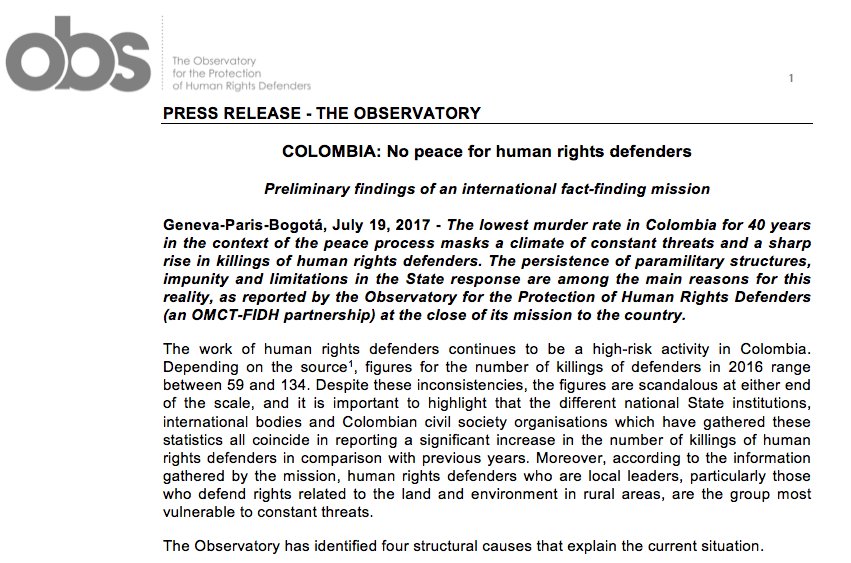Geneva-Paris-Bogotá, July 19, 2017 – The lowest murder rate in Colombia for 40 years in the context of the peace process masks a climate of constant threats and a sharp rise in killings of human rights defenders. The persistence of paramilitary structures, impunity and limitations in the State response are among the main reasons for this reality, as reported by the Observatory for the Protection of Human Rights Defenders (an OMCT-FIDH partnership) at the close of its mission to the country, carried out in the framework of ProtectDefenders.eu, the EU Human Rights Defenders mechanism.

The work of human rights defenders continues to be a high-risk activity in Colombia. Depending on the source[1], figures for the number of killings of defenders in 2016 range between 59 and 134. Despite these inconsistencies, the figures are scandalous at either end of the scale, and it is important to highlight that the different national State institutions, international bodies and Colombian civil society organisations which have gathered these statistics all coincide in reporting a significant increase in the number of killings of human rights defenders in comparison with previous years. Moreover, according to the information gathered by the mission, human rights defenders who are local leaders, particularly those who defend rights related to the land and environment in rural areas, are the group most vulnerable to constant threats.
The Observatory has identified four structural causes that explain the current situation.
In the first place, the main attacks against defenders take place amid the persistence of paramilitary structures in the country, identified as the main perpetrators of these crimes. The mission was able to document various cases of collusion and/or connivance between State officials and paramilitary groups in different parts of the country including Norte de Santander and Antioquia in a context in which the authorities continue to deny the existence of this phenomenon.
“In the words of a Colombian defender: ‘If something does not exist, it cannot be confronted’. That is why the Government must publicly recognise the persistence of paramilitary structures in Colombia and confront this phenomenon by effectively and decidedly applying the relevant measures included in the peace agreement”, declared Miguel Martín Zumalacárregui, Director of the OMCT Office in Brussels and delegate of the Observatory mission in Colombia.
In second place, according to the Observatory findings, there is now a tendency among public authorities to recognise the legitimacy of human rights defenders’ work. However, there continue to be examples of smears and stigmatisation against defenders. For example, in Sur de Bolívar, Bucaramanga and Barrancabermeja, in a case where five defenders were arrested, one was linked by the Prosecutor to the National Liberation Army (Ejército de Liberación Nacional – ELN) as a result of his leadership in the organisation of demonstrations.
The criminalisation of social protest continues to cause concern. The mission received a number of reports describing the use of repression by the authorities during peaceful protests in Colombia, including numerous examples of excessive use of force against protestors. The mission heard about a number of cases involving defenders in the department of Cauca and during the civic strike in the city of Buenaventura.
In third place, the Observatory notes the persistence of high levels of impunity, which reinforce the vulnerability of all human rights defenders in the country. According to the information received, there have only been convictions in five cases of murders of defenders over the past year. What is more, in May 2017 the first conviction in the history of Colombia was made in a case related to threats against a human rights defender. A bodyguard was convicted of threats to the person he was responsible for protecting; however, there has been no investigation into who may have planned the crime.
“We are particularly concerned about the low priority given to cases of threats by the Public Prosecutor’s office. There is also a tendency, in all investigations into attacks against defenders and in the few cases that lead to a conviction, that these investigations are limited to those who carried out the crimes, while those who planned the crimes are not investigated”, stated Vincent Vallies, international expert and mission delegate.
Finally, in the fourth place, the Observatory notes that despite the considerable institutional framework dedicated to protecting human rights defenders in Colombia, the institutional response continues to be weak for the following reasons: the inadequacy of measures to tackle the structural causes that place defenders at risk, the lack of local implementation of national guidelines and plans, insufficient guarantees to carry out work to defend human rights, and a lack of measures with a differential focus according to age, ethnicity, gender and socio-economic situation.
Context:
The Observatory carried out an international fact-finding mission in different areas of Colombia (Bogotá, Norte de Santander, Antioquia and Valle del Cauca) from July 11 to 19, 2017. The delegation was composed of Vincent Vallies (international expert, French nationality) and Miguel Martín Zumalacárregui (Director of the OMCT Office in Brussels and Human Rights Advisor for the Observatory at OMCT, Spanish nationality), and was accompanied by Jahel Quiroga (Director of the Reiniciar Corporation – Corporación Reiniciar and member of the OMCT Executive Board), and Ana María Rodríguez (Representative before the United Nations, Colombian Commission of Jurists – Comisión Colombiana de Juristas – CCJ).
In the coming months the Observatory will publish a report on its specific findings, conclusions and recommendations regarding the situation of human rights defenders in Colombia. In addition, as part of a strategy to strengthen the Observatory’s work on Colombia, a report will also be published over the following months documenting various cases of attacks against human rights defenders who defend land and environmental rights in the context of large-scale development projects.
Source: OMCT


